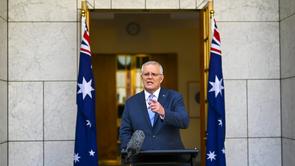 Australian Prime Minister Scott Morrison gestures during a news conference at Parliament House in Canberra, Australia, April 10, 2022. (LUKAS COCH / AAP IMAGE VIA AP)
Australian Prime Minister Scott Morrison gestures during a news conference at Parliament House in Canberra, Australia, April 10, 2022. (LUKAS COCH / AAP IMAGE VIA AP)
The Australian polls scheduled for May 21 are already showing signs of being an ugly affair with plenty of mud being thrown by both sides.
The election is a choice between a Liberal National Party Coalition government led by Scott Morrison which has been in power for nine years (three terms) and an untested Labor opposition led by Anthony Albanese.
Morrison is the Coalition’s third prime minister in nine years and is seeking a fourth term based on his government’s economic management during the pandemic, and on national security.
For its part, Labor is putting itself forward as the ‘caring’ party — a party that cares about the individual, childcare, Medicare and aged care.
Michelle Grattan, professorial fellow at the University of Canberra, said the election is a contest between a “desperate prime minister and an opposition leader who sometimes looks as though he has been promoted beyond his capability”.
She said neither the government nor Labor is putting forward an agenda that will seize the imagination of Australians.
“This is an election that will be fought on the political low ground,” Grattan said in a commentary for The Conversation website. “It’s a battle between a leader who’s lost the confidence of many of the public and one who has yet to gain it.”
On April 11, barely 12 hours into the six-week campaign, Albanese did little to galvanize that all-important public trust when he was asked a simple question: What is the current unemployment rate? Looking confused, he fumbled an answer of 5.4 percent which was wrong (it is 4 percent) and admitted, “I’m not sure what it is.”
He later apologized for not remembering the number and said it was an error on his part and no one else’s.
Polls show Labor and the Coalition neck and neck, with independents and minor parties holding the balance of power.
According to a Newspoll published by The Australian newspaper on April 11, Morrison’s government was trailing the opposition Labor Party 47-53 on a two-party preferred basis.
It marked the second consecutive poll the Coalition had made up ground on Labor after trailing 44-56 in late January.
Morrison said the election is “incredibly important because there is so much at stake for Australia”.
“It’s about our country and our future,” he told journalists after visiting the Governor-General, David Hurley, on April 10 to call the election.
Political commentator Paul Kelly, writing in The Australian on April 11, said Morrison’s message to the electorate is clear: “Vote from a hard head not a weak heart, don’t gamble at a time of tough economic challenge and dangerous global instability.”
Whether Australians will be swayed by the Cold War rhetoric and anti-China stance of Morrison and his government remains to be seen.
The ruling party, focusing on fears that China will exploit Australia’s election to secure a security deal with the Solomon Islands, sent a federal minister to the Solomons’ capital Honiara in a mid-campaign dash.
Minister for International Development and the Pacific Zed Seselja told Solomon Islands Prime Minister Manasseh Sogavare on April 13 that he should not sign the security deal with China, and warned that Beijing’s presence could unsettle the region, the Sydney Morning Herald reported on its website.
Recent polling suggests voters trust Labor more than the Coalition to manage the relationship with China.
The Morrison government is “hell-bent” on putting national security and defense front and center in the lead-up to the election, said Professor Peter Dean, chair of defense studies and director of the defense and security institute at the University of Western Australia.
The Australian Council of Social Service has urged parties and candidates to choose policies that tackle the big challenges that face the country — poverty, inequality and climate change — to forge a safer, fairer and more equal future.
“Australia is far from finished with this pandemic, and our future challenges are significant,” said Cassandra Goldie, CEO of ACOSS.



